Established in 1999, the Unit for the Study of Personality in Politics (USPP) is a collaborative faculty–student research program in the psychology of politics at St. John’s University and the College of St. Benedict in Minnesota, directed by Aubrey Immelman, Ph.D., associate professor of psychology, who specializes in the psychological assessment of presidential candidates and world leaders.
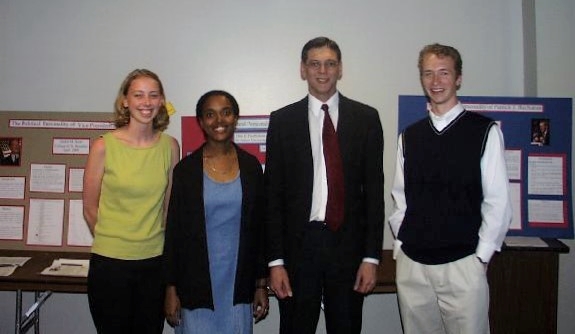
USPP founding members Jennie Scott, Aví Bahadoor, Aubrey Immelman (director), and Jason Bartos. USPP contributors Scott, Bahadoor, and Bartos, along with Kelly Kalla and Dale Fredrickson (not pictured) presented their research on the political personalities of Al Gore, Hillary Clinton, Pat Buchanan, and George W. Bush at the 2000 Minnesota Undergraduate Psychology Conference at Macalester College in St. Paul, Minnesota, in April 2000.


The Unit for the Study of Personality in Politics is operated solely for research and educational purposes. The Unit does not advocate support for or defeat of any candidate for any political office. Political analysis published by the director or research associates of the Unit is the personal opinion of those individuals, based on empirical analysis of personality in politics and the influence of personality traits on high-level leadership.
USPP collaborators present studies of 2016 U.S. presidential candidates at St. John’s University on April 21, 2016.
Mission
The mission of the Unit is to conduct psychological assessments of candidates for public office and to disseminate the findings to professionals, the media, and the voting public.

St. John’s University
Related links
USPP on ResearchGate » https://www.researchgate.net/profile/Aubrey_Immelman
USPP on Digital Commons » https://digitalcommons.csbsju.edu/psychology_pubs
Former USPP website (1999-2008) » http://uspp.csbsju.edu
USPP research reports and analysis (2008-2016) » Immelman.us
USPP on Twitter » @PolPsyProfiling
Studies available for download
Index of psychological studies of U.S. presidents and presidential candidates, foreign leaders, and prominent terrorist figures conducted at the Unit for the Study of Personality in Politics » http://personality-politics.org/index-of-studies-conducted-at-the-unit-for-the-study-of-personality-in-politics
The Attempted Assassination of Donald Trump: What Motivated Thomas Matthew Crooks?
July 14, 2024

Annotated photo showing what appears to be a projectile passing by Donald J. Trump during a rally in Butler, Pa., on Saturday, July 13, 2024. (Photo credit: Doug Mills / The New York Times)
Twenty-four hours after the failed assassination attempt on former U.S. president Donald Trump, there is no indication that 20-year-old shooter Thomas Matthew Crooks was a political extremist, ideologically motivated, or radicalized by heated political rhetoric.
Based on the limited information in the public record, Crooks’s motive appears to be largely psychological, not ideological.
In an interview with CNN correspondent Danny Freeman on July 14, Jason Kohler, who went to the same high school as Crooks, described him as “very bland” and said Crooks “didn’t show no facial expressions” and kept “very to himself.”
Based the above description, the initial clinical impression is that Crooks was deeply introverted, lacking in strong social attachments, and possibly diagnosable as having a schizoid personality disorder.
Although this rudimentary personality assessment – based purely on anecdotal information from a single source – is insufficient to reveal Crooks’s motive for wanting to kill Trump, one hypothesis to explore is that Crooks may have been driven by a desire for attention or fame, possibly to compensate for low self-esteem and a persistent sense of powerlessness. In Crooks’s mind, homicidal violence against a famous public figure may ultimately have provided the prospect of posthumous personal recognition and respect.
Related report: Inside the mind of an American shooter (July 20, 2024)
Featured studies
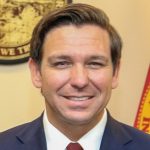 The Personality Profile of 2024 Republican Presidential Contender Ron DeSantis (Research Poster). Unit for the Study of Personality in Politics, St. John’s University/College of St. Benedict, August 2023. Abstract and link for poster download at Digital Commons: http://digitalcommons.csbsju.edu/psychology_pubs/144/
The Personality Profile of 2024 Republican Presidential Contender Ron DeSantis (Research Poster). Unit for the Study of Personality in Politics, St. John’s University/College of St. Benedict, August 2023. Abstract and link for poster download at Digital Commons: http://digitalcommons.csbsju.edu/psychology_pubs/144/
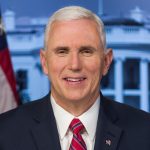 The Political Personality of U.S. Vice President Mike Pence. Unit for the Study of Personality in Politics, St. John’s University/College of St. Benedict, May 2017. Abstract and link for full-text (19 pages; PDF) download at Digital Commons: http://digitalcommons.csbsju.edu/psychology_pubs/118/
The Political Personality of U.S. Vice President Mike Pence. Unit for the Study of Personality in Politics, St. John’s University/College of St. Benedict, May 2017. Abstract and link for full-text (19 pages; PDF) download at Digital Commons: http://digitalcommons.csbsju.edu/psychology_pubs/118/
 The Personality Profile of Republican Presidential Contender Chris Christie (Brief Report). Unit for the Study of Personality in Politics, St. John’s University/College of St. Benedict, June 2023. Abstract and link for full-text (2 pages; PDF) download at Digital Commons: http://digitalcommons.csbsju.edu/psychology_pubs/140/
The Personality Profile of Republican Presidential Contender Chris Christie (Brief Report). Unit for the Study of Personality in Politics, St. John’s University/College of St. Benedict, June 2023. Abstract and link for full-text (2 pages; PDF) download at Digital Commons: http://digitalcommons.csbsju.edu/psychology_pubs/140/
Psychology Faculty Publications
Topical profiles — International conflict
Compare the psychological profiles of Vladimir Putin, Volodymyr Zelenskyy, and Joe Biden
The Political Personality of Russian Federation President Vladimir Putin.
Research report, Unit for the Study of Personality in Politics, January 2017.
Abstract and link for full-text (38 pages; PDF) download at Digital Commons: http://digitalcommons.csbsju.edu/psychology_pubs/104/
The Personality Profile and Leadership Style of U.S. President Joe Biden.
Paper presented at the 44th Annual Scientific Meeting of the International Society of Political Psychology, July 11-13, 2021. Abstract and link for full-text (27 pages; PDF) download at Digital Commons: https://digitalcommons.csbsju.edu/psychology_pubs/132/
The Personality Profile and Leadership Style of Ukrainian President Volodymyr Zelenskyy. PowerPoint presented by Elise Vomacka at the 46th Annual Scientific Meeting of the International Society of Political Psychology, Montréal, Québec, July 9–11, 2023. Abstract and download link at Digital Commons: https://digitalcommons.csbsju.edu/psychology_pubs/143/
Psychological profiles of Vladimir Putin and Volodymyr Zelenskyy presented at ISPP
July 10, 2023
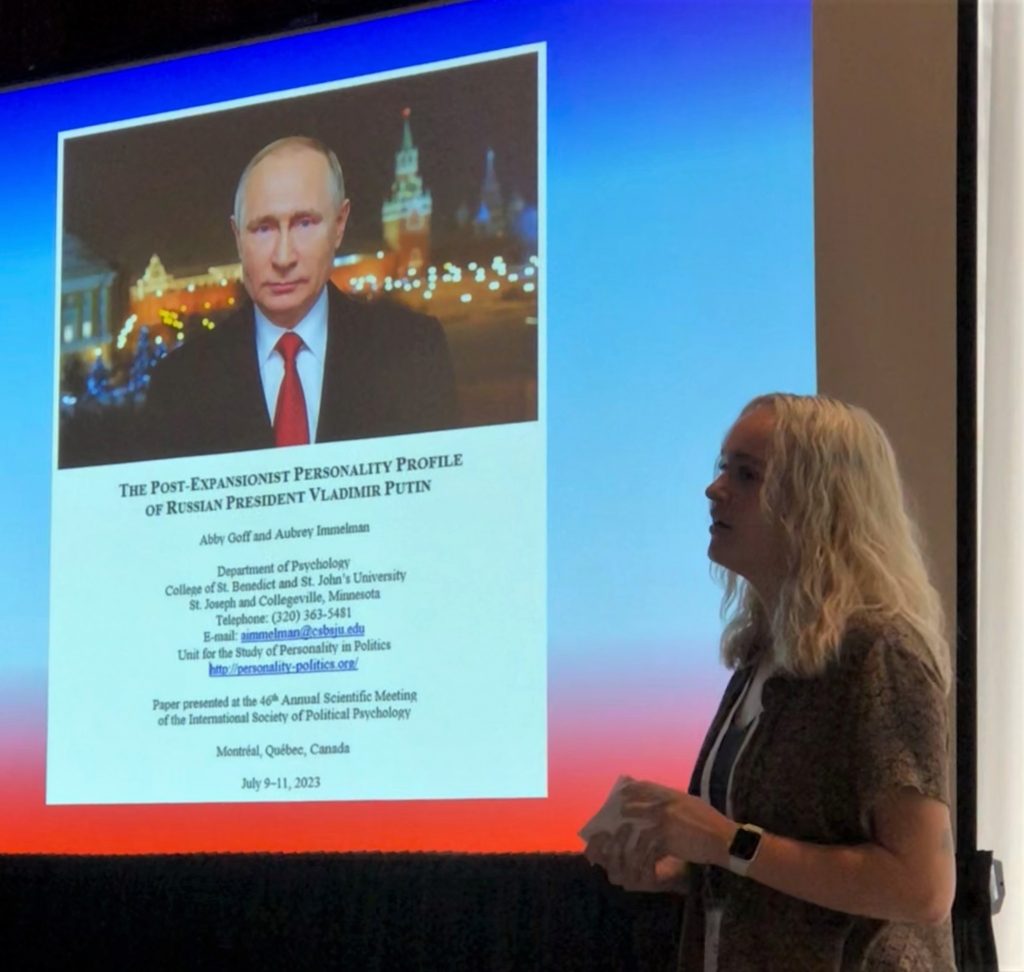
Abby Goff presents her research on “The Post-Expansionist Personality Profile of Russian President Vladimir Putin” at the annual scientific meeting of the International Society of Political Psychology, Montréal, Québec, July 10, 2023. Access the PowerPoint presentation at Digital Commons or personality-politics.org/russia.
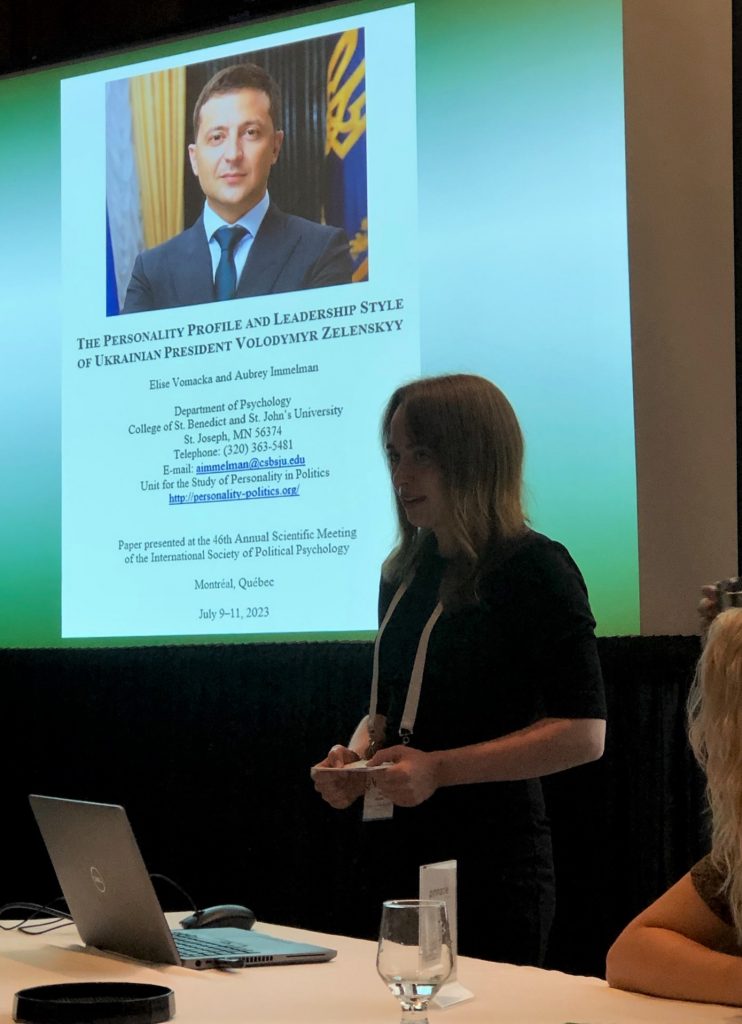
Elise Vomacka presents her research on “The Personality Profile and Leadership Style of Ukrainian President Volodymyr Zelenskyy” at the annual scientific meeting of the International Society of Political Psychology, Montréal, Québec, July 10, 2023. Access the PowerPoint presentation at Digital Commons or personality-politics.org/ukraine.
Interview: Jamie Dimon’s presidential prospects — June 2, 2023
President Dimon would be square peg in Oval hole (John Foley, Breakingviews, Reuters, June 2, 2023) — If part of former U.S. President Donald Trump’s appeal rested on empty claims of business savvy, Dimon is the real deal. … Temperament is on Dimon’s side, too. Presidents who succeed tend to combine common personality traits, according to psychologist Aubrey Immelman, who has ranked actual and hopeful commanders in chief. Voters respond favorably to dominance, extroversion and ambition verging on benign narcissism, all of which describe Dimon. … Full text
Interview: The assessment of personality in politics — July 28, 2022
Psicologia politica e analisi della personalità dei politici: Intervista al Dr. Aubrey Immelman
(State of Mind: il giornale delle scienze psicologiche, 28 Iuglio 2022)
Scroll down at the link for the English version of the interview.
Announcement — September 15, 2022
Elise Vomacka
 College of St. Benedict senior psychology major Elise Vomacka has been appointed Director of Undergraduate Research at the Unit for the Study of Personality in Politics for the 2022–23 academic year.
College of St. Benedict senior psychology major Elise Vomacka has been appointed Director of Undergraduate Research at the Unit for the Study of Personality in Politics for the 2022–23 academic year.
Her duties include training students in Personality Psychology courses in data collection procedures and coordinating undergraduate group research projects on the personality profiles and leadership styles of U.S. presidential candidates and world leaders.
Elise worked as a research fellow in the Unit for the Study of Personality in Politics during the summers of 2021 and 2022 and as a behavioral health intern at CentraCare, St. Cloud, from January to May 2022. Elise’s current research is devoted to the development of a personality profile of Ukrainian President Volodymyr Zelenskyy, to be presented at the 2023 annual scientific meeting of the International Society of Political Psychology (ISPP) in Montreal.
Psychological profiles of Vladimir Putin and Xi Jinping presented at MUPC — April 30, 2022
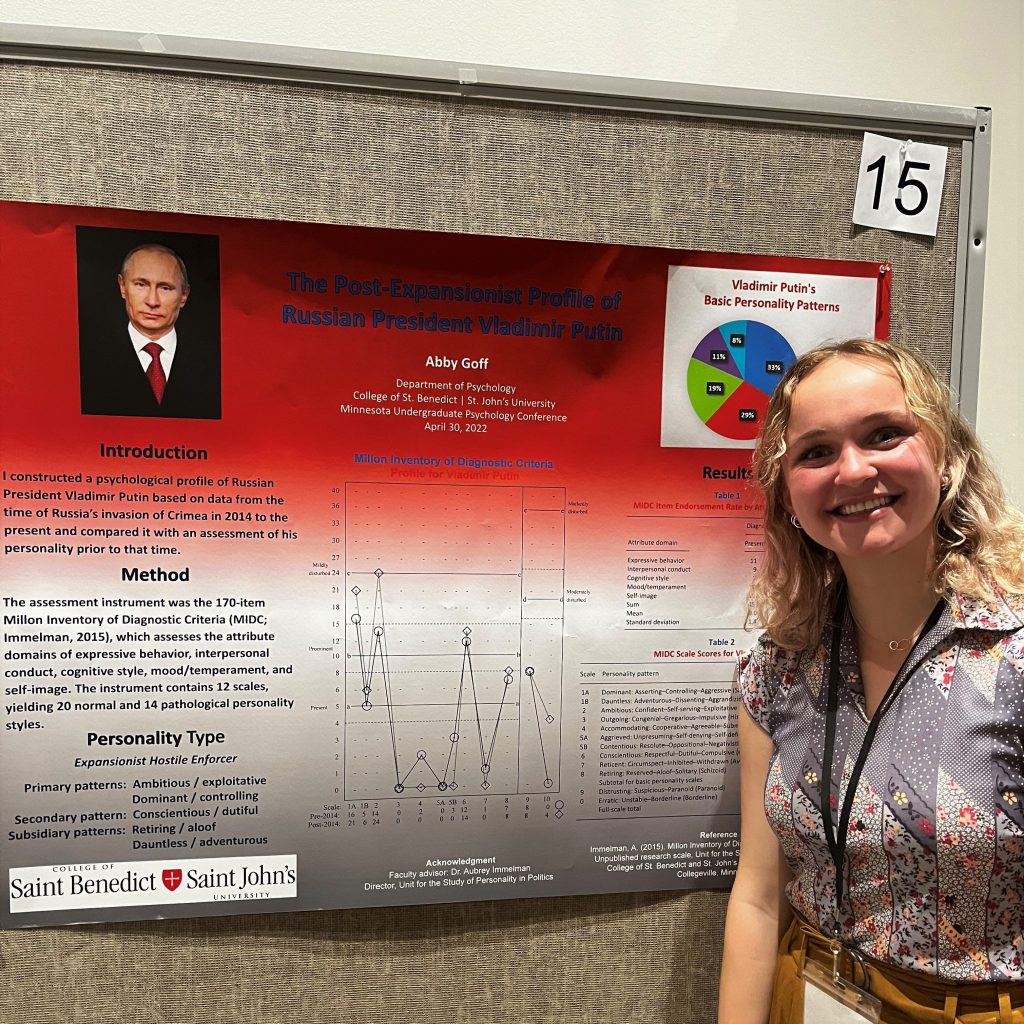
Abby Goff presents her research poster on “The Post-Expansionist Profile of Russian President Vladimir Putin” at the Minnesota Undergraduate Psychology Conference, Macalester College, St. Paul, Minnesota, April 30, 2022. View the poster at personality-politics.org/russia.
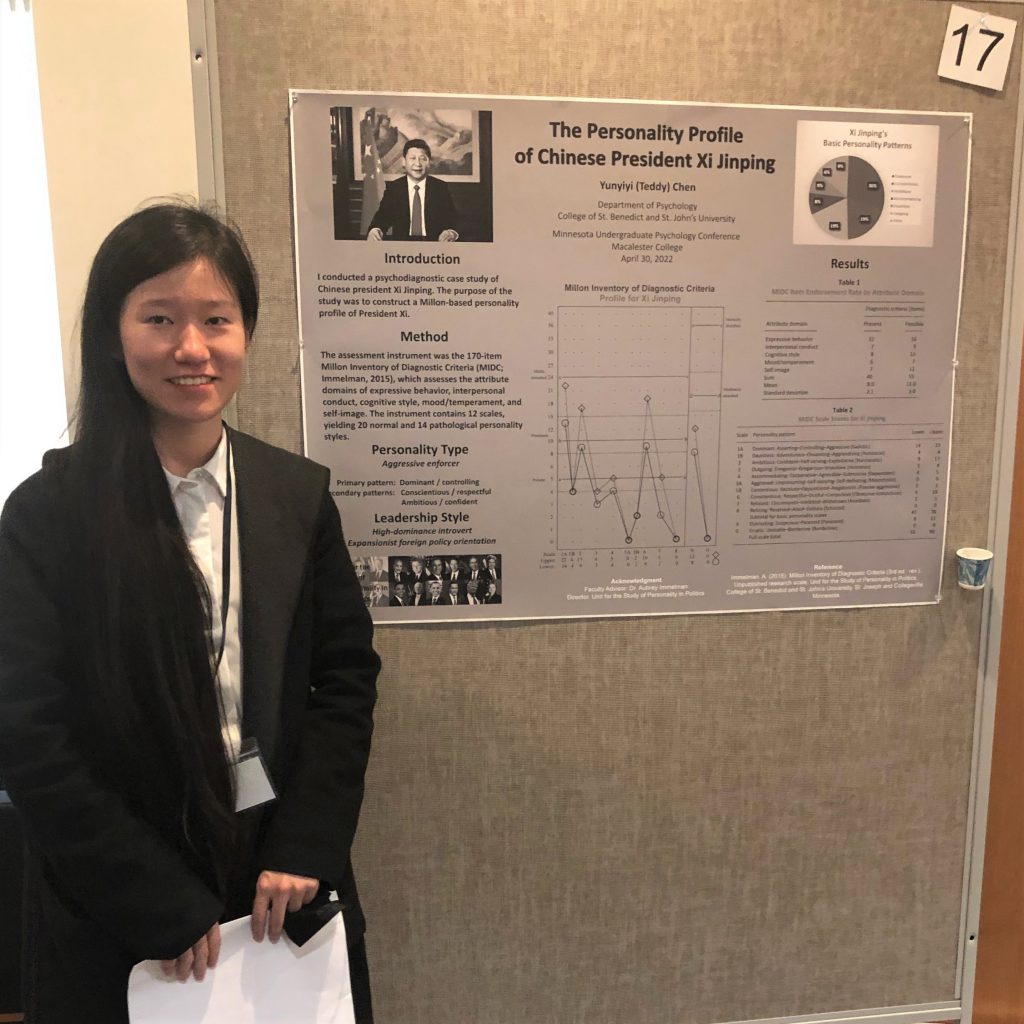
Yunyiyi Chen presents her research poster on “The Personality Profile of Chinese President Xi Jinping” at the Minnesota Undergraduate Psychology Conference, Macalester College, St. Paul, Minnesota, April 30, 2022. View the poster at personality-politics.org/china.
Personality profile and leadership style analysis of China’s President Xi Jinping presented at ISPP — July 12, 2021
 Immelman, A., & Chen, Y. (2021, July). The personality profile and leadership style of China’s President Xi Jinping. Paper presented at the 44th Annual Meeting of the International Society of Political Psychology, July 11-13, 2021. Abstract and link for full-text (33 pages; PDF) download at Digital Commons: https://digitalcommons.csbsju.edu/psychology_pubs/141/
Immelman, A., & Chen, Y. (2021, July). The personality profile and leadership style of China’s President Xi Jinping. Paper presented at the 44th Annual Meeting of the International Society of Political Psychology, July 11-13, 2021. Abstract and link for full-text (33 pages; PDF) download at Digital Commons: https://digitalcommons.csbsju.edu/psychology_pubs/141/
PowerPoint: Xi Jinping Personality and Leadership Profile
Personality profile and leadership style analysis of Canada’s Prime Minister Justin Trudeau presented at ISPP — July 12, 2021
Juliana Khoury presented her paper, with Aubrey Immelman, on “The Personality Profile and Leadership Style of Canadian Prime Minister Justin Trudeau” at the 44th Annual Scientific Meeting of the International Society of Political Psychology (virtual conference), July 12, 2021.
Full-text research paper
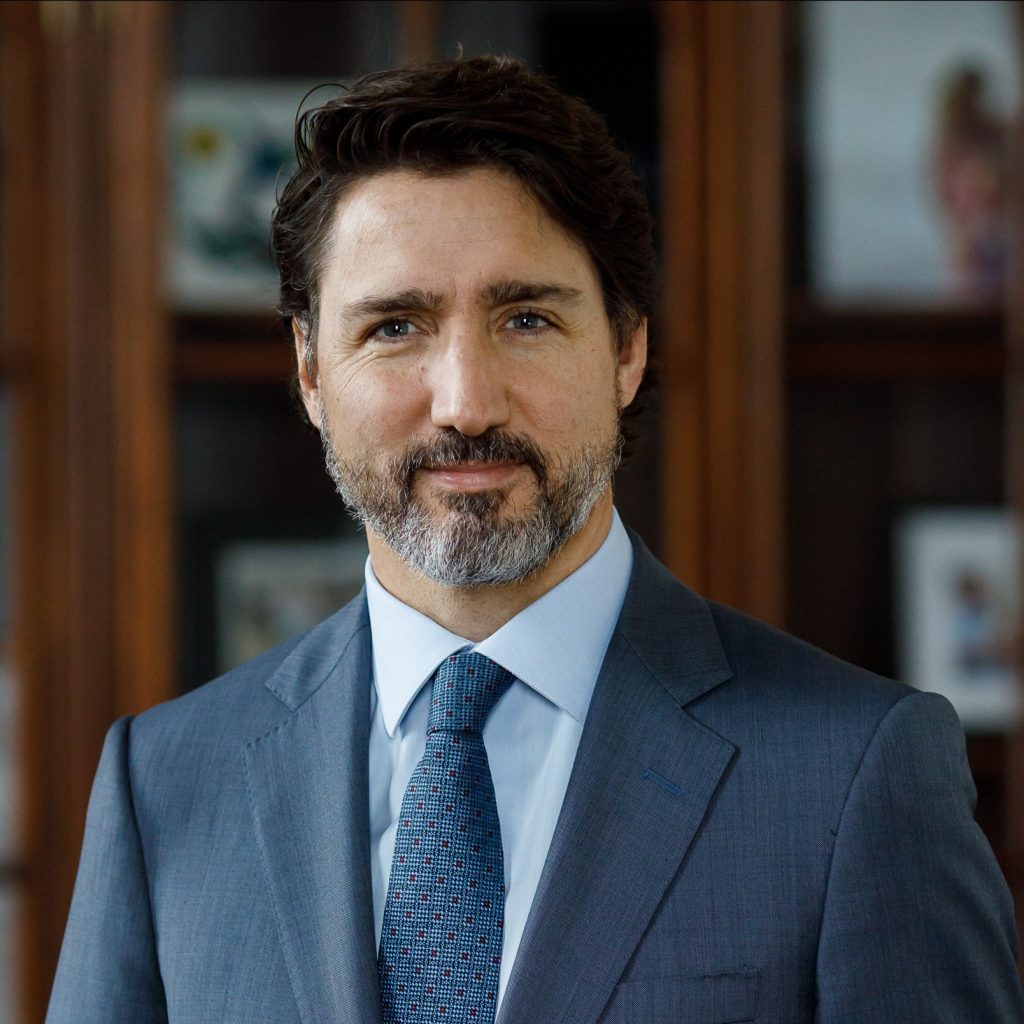 The Personality Profile and Leadership Style of Canadian Prime Minister Justin Trudeau. Paper presented at the 44th Annual Scientific Meeting of the International Society of Political Psychology, July 11-13, 2021. Abstract and link for full-text (33 pages; PDF) download at Digital Commons: https://digitalcommons.csbsju.edu/psychology_pubs/133/
The Personality Profile and Leadership Style of Canadian Prime Minister Justin Trudeau. Paper presented at the 44th Annual Scientific Meeting of the International Society of Political Psychology, July 11-13, 2021. Abstract and link for full-text (33 pages; PDF) download at Digital Commons: https://digitalcommons.csbsju.edu/psychology_pubs/133/
Personality profile and leadership style analysis of President Joe Biden presented at ISPP — July 12, 2021
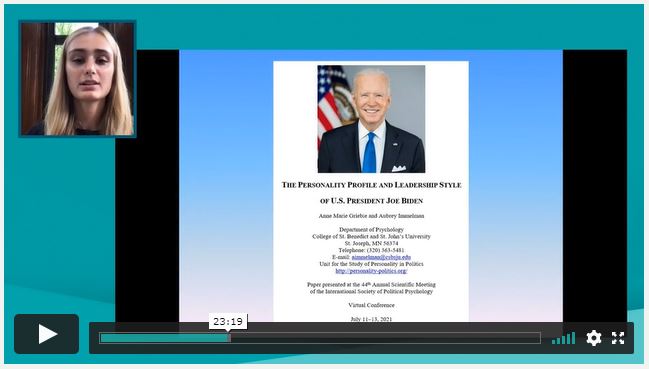
Anne Marie Griebie presents her paper, with Aubrey Immelman, on “The Personality Profile and Leadership Style of U.S. President Joe Biden” at the 44th Annual Scientific Meeting of the International Society of Political Psychology (virtual conference), July 12, 2021.
Full-text research paper
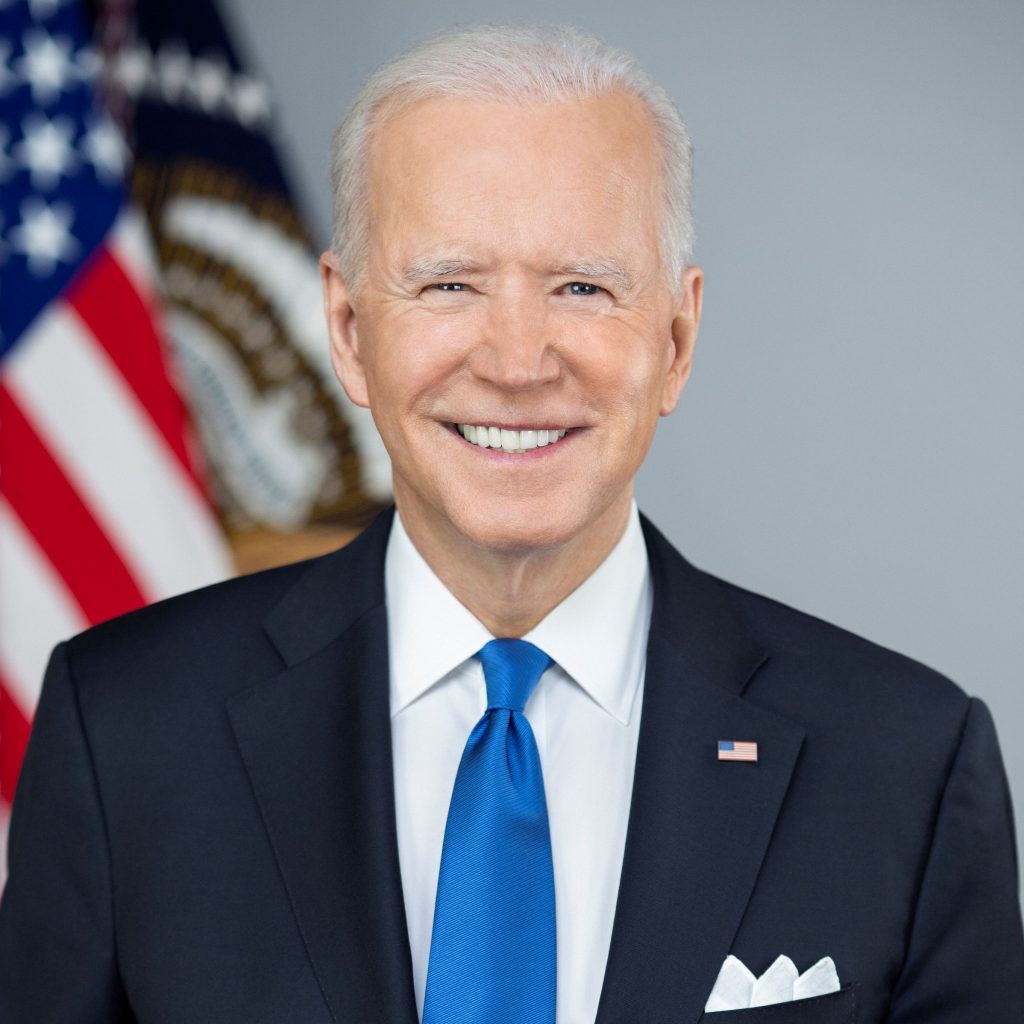 The Personality Profile and Leadership Style of U.S. President Joe Biden. Paper presented at the 44th Annual Scientific Meeting of the International Society of Political Psychology, July 11-13, 2021. Abstract and link for full-text (27 pages; PDF) download at Digital Commons: https://digitalcommons.csbsju.edu/psychology_pubs/132/
The Personality Profile and Leadership Style of U.S. President Joe Biden. Paper presented at the 44th Annual Scientific Meeting of the International Society of Political Psychology, July 11-13, 2021. Abstract and link for full-text (27 pages; PDF) download at Digital Commons: https://digitalcommons.csbsju.edu/psychology_pubs/132/
U.S. Capitol Riot — Culpability, Response, and Risk Assessment — Jan. 8, 2021
Capitol attack leads Democrats to demand that Trump leave office (Peter Baker & Maggie Haberman, New York Times, Jan. 8, 2021) — [Speaker of the House] Pelosi and Senator Chuck Schumer of New York, the Democratic leader, called on [Vice President] Pence and the cabinet to invoke the 25th Amendment. But after the vice president refused to take their telephone calls, Ms. Pelosi told reporters that she would pursue impeachment if he did not act. “While it’s only 13 days left, any day can be a horror show for America,” Ms. Pelosi said, calling Mr. Trump’s actions on Wednesday a “seditious act.” “This president should not hold office one day longer,” said Mr. Schumer. …
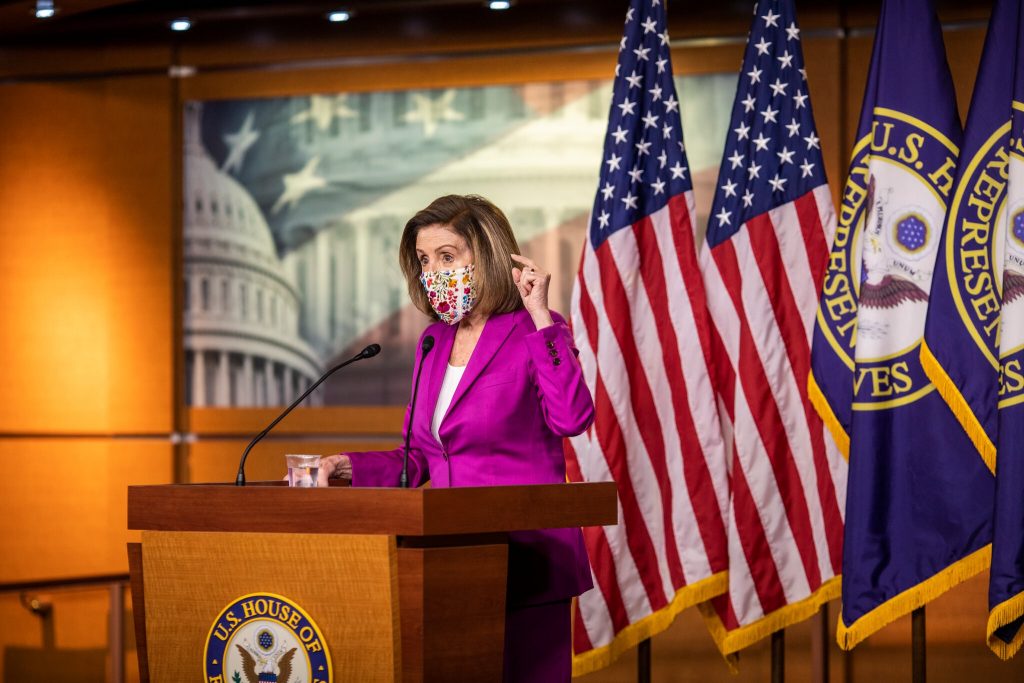
Speaker Nancy Pelosi called on Jan. 7, 2021 for President Trump to be stripped of his powers through the 25th Amendment or to be impeached again. (Photo credit: Jason Andrew / The New York Times)
Mob behavior and riots were foreseeable
The unintended consequences of President Donald Trump’s January 6 speech at the “Save America” rally and the subsequent “Stop the Steal” march could have been foreseen. Emotionally arousing his followers and then urging the crowd to march on the Capitol without providing structure or direction created a volatile situation, based on social-scientific knowledge regarding collective behavior — most notably emergent-norm theory. According to social scientists Ralph Turner and Lewis Killian (1957), crowds begin as collectivities composed of people with mixed interests and motives. In the case of less stable crowds — such as a large collective of demonstrators or protesters — norms may be vague and ambiguous, as when one person decides to break the glass windows of a storefront and observers join in and start looting; new, increasingly polarized, norms rapidly emerge and many people are caught up in those escalating norms even though their actions may be at odds with their typical social behavior.
Impeachment would be shortsighted and counterproductive
If there is a legitimate national security interest in restraining or incapacitating President Trump, impeachment may well be one of the worst interventions to diminish the perceived threat. If indeed the president is psychologically so unstable as to pose an imminent threat to public safety and social order, making him feel cornered and under siege would magnify, not mitigate, the potential threat.
——————————————
Update: January 12, 2021
Information has emerged that the attack on the Capitol was planned prior to the events of January 6, suggesting that collective behavior — specifically crowd psychology as conceptualized by emergent-norm theory — was not the primary driver of the mob behavior following the president’s rally:
FBI report warned of ‘war’ at Capitol, contradicting claims there was no indication of looming violence (Devlin Barrett & Matt Zapotosky, Washington Post, Jan. 12, 2021) — A situational information report approved for release the day before the U.S. Capitol riot painted a dire portrait of dangerous plans. … “As of 5 January 2021, FBI Norfolk received information indicating calls for violence in response to ‘unlawful lockdowns’ to begin on 6 January 2021 in Washington, D.C.,” the document says. “An online thread discussed specific calls for violence to include stating ‘Be ready to fight. Congress needs to hear glass breaking, doors being kicked in, and blood from their BLM and Pantifa slave soldiers being spilled. Get violent. Stop calling this a march, or rally, or a protest. Go there ready for war. We get our President or we die. NOTHING else will achieve this goal.’” …
——————————————
Update: January 13, 2021
Trump impeached for inciting insurrection
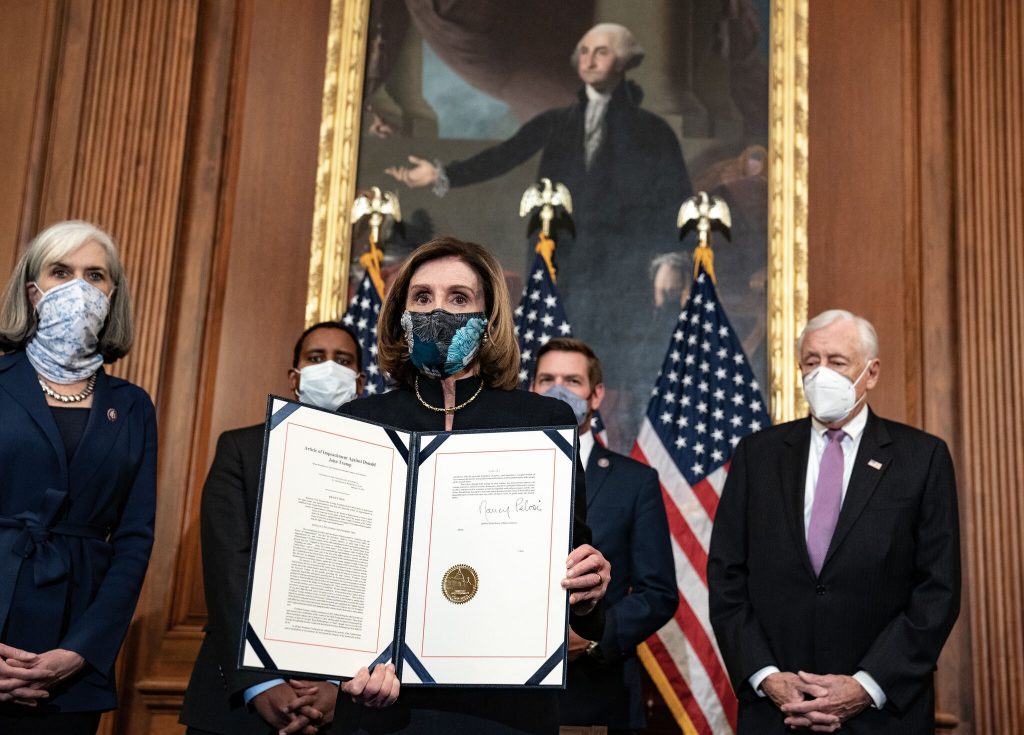
Speaker Nancy Pelosi with the article of impeachment, Jan. 13, 2021. (Photo credit: Anna Moneymaker / The New York Times)
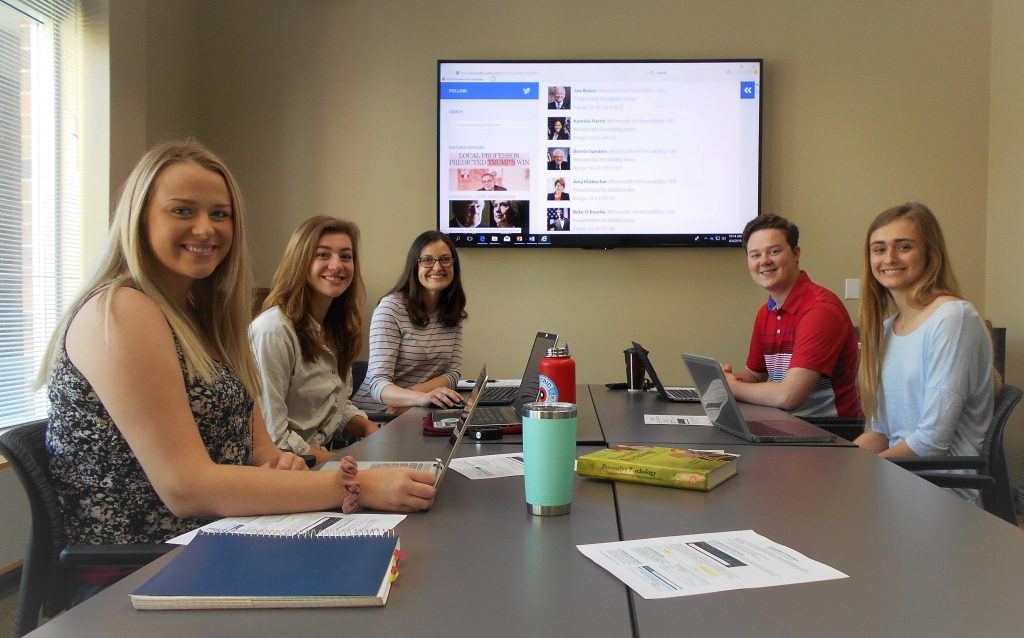
Diana Symons, Associate Director for Learning and Research at the College of St. Benedict and St. John’s University, instructs USPP summer 2019 research assistants Cassidy Smith, Suntina Spehar, Austen Luetmer, and Annie Griebie in database research methods for a study of contenders for the Democratic nomination in the 2020 U.S. presidential election, June 4, 2019.
Announcement — September 7, 2020
 College of St. Benedict senior premedical psychology major Anne Marie Griebie has been reappointed Director of Undergraduate Research at the Unit for the Study of Personality in Politics for the 2020-21 academic year.
College of St. Benedict senior premedical psychology major Anne Marie Griebie has been reappointed Director of Undergraduate Research at the Unit for the Study of Personality in Politics for the 2020-21 academic year.
Her duties include training students in Personality Psychology courses in data collection procedures and coordinating undergraduate group research projects on the personality profiles and leadership styles of U.S. presidents and world leaders.
Annie worked as a full-time research fellow in the Unit for the Study of Personality in Politics during the summers of 2019 and 2020.
In summer 2020 Griebie co-authored a paper on Donald Trump, which was presented at the annual scientific meeting of the International Society of Political Psychology (ISPP), and papers on Joe Biden and Kamala Harris.
Updates
 Annie Griebie’s co-authored paper on Joe Biden was presented at the 2021 meeting of the ISPP.
Annie Griebie’s co-authored paper on Joe Biden was presented at the 2021 meeting of the ISPP.
In October 2021, Griebie received the Minnesota Psychological Association’s Donald G. Paterson Outstanding Undergraduate Student Award.
In fall 2021 Griebie entered the doctoral program in Industrial/Organizational Psychology at the University of Minnesota, considered one of the top three I/O PhD programs in the United States.
USPP releases new research report — September 1, 2020
 The Political Personality of 2020 Democratic Vice-Presidential Nominee Kamala Harris. Working paper, Unit for the Study of Personality in Politics, St. John’s University/College of St. Benedict, September 2020. Abstract and link for full-text (26 pages; PDF) download at Digital Commons: https://digitalcommons.csbsju.edu/psychology_pubs/131/
The Political Personality of 2020 Democratic Vice-Presidential Nominee Kamala Harris. Working paper, Unit for the Study of Personality in Politics, St. John’s University/College of St. Benedict, September 2020. Abstract and link for full-text (26 pages; PDF) download at Digital Commons: https://digitalcommons.csbsju.edu/psychology_pubs/131/
Annie Griebie explains the conceptual framework, methodology, and results of the assessment of Sen. Kamala Harris’s personality and leadership style. (9:53)
USPP releases new research report — August 17, 2020
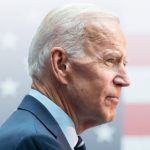 The Political Personality of 2020 Democratic Presidential Nominee Joe Biden. Working paper, Unit for the Study of Personality in Politics, St. John’s University/College of St. Benedict, August 2020. Abstract and link for full-text (22 pages; PDF) download at Digital Commons: https://digitalcommons.csbsju.edu/psychology_pubs/130/
The Political Personality of 2020 Democratic Presidential Nominee Joe Biden. Working paper, Unit for the Study of Personality in Politics, St. John’s University/College of St. Benedict, August 2020. Abstract and link for full-text (22 pages; PDF) download at Digital Commons: https://digitalcommons.csbsju.edu/psychology_pubs/130/
Annie Griebie explains the conceptual framework, methodology, and results of the assessment of Vice President Joe Biden’s personality and leadership style. (9:42)
Personality profile and leadership style analysis of President Donald Trump presented at ISPP — July 16, 2020

Aubrey Immelman presents his paper, with Anne Marie Griebie, on “The Personality Profile and Leadership Style of U.S. President Donald J. Trump in Office” at the 43rd Annual Scientific Meeting of the International Society of Political Psychology, July 16, 2020. The meeting, originally scheduled for Berlin, Germany, was conducted in virtual format due to the global COVID-19 pandemic.
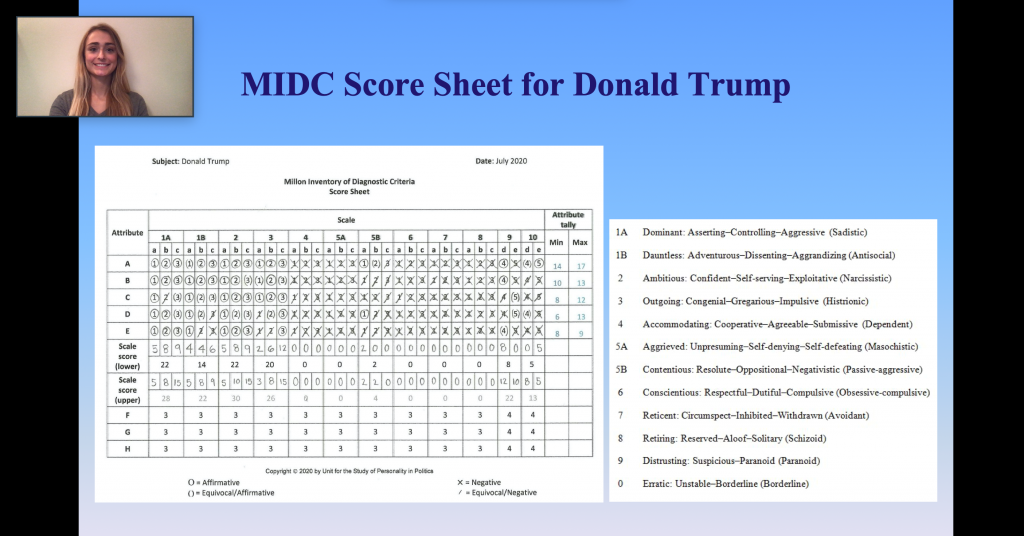
Annie Griebie explains the scoring system used in the assessment of President Donald Trump’s personality as revealed in office.
The Personality Profile and Leadership Style of U.S. President Donald J. Trump in Office. Paper presented at the 43rd Annual Scientific Meeting of the International Society of Political Psychology, Berlin, Germany, July 14-16, 2020. Abstract and link for full-text (71 pages; PDF) download at Digital Commons: http://digitalcommons.csbsju.edu/psychology_pubs/129/
Annie Griebie explains the conceptual framework, methodology, and results of her assessment of President Donald Trump’s personality as revealed in office. (9:39)
USPP completes study of Democratic presidential contenders — July 2019
Data collection has been completed for a study of viable 2020 Democratic presidential contenders, similar to the study of Republican contenders conducted during the 2016 election cycle.
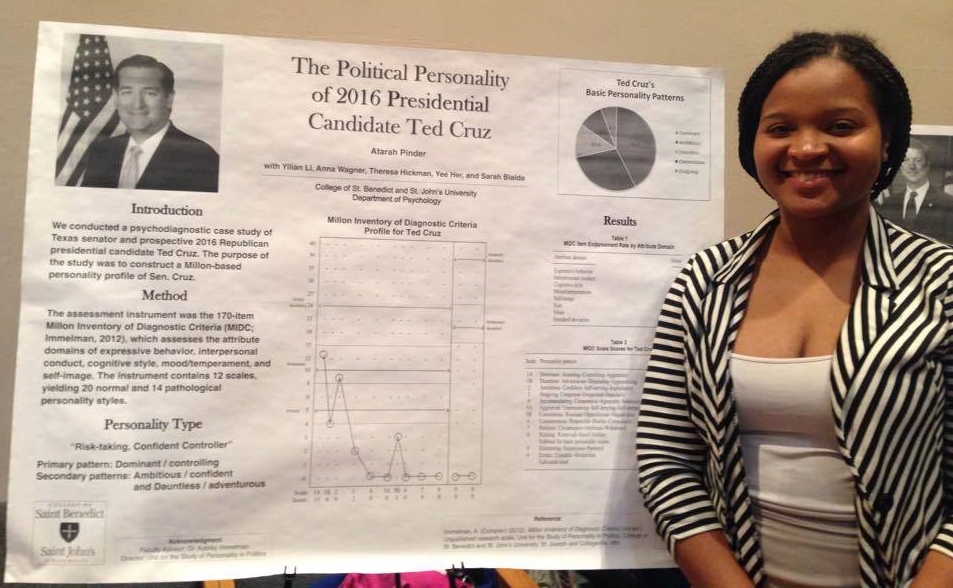
USPP associate Atarah Pinder presents her poster “The Political Personality of 2016 Presidential Candidate Ted Cruz” at Scholarship and Creativity Day, College of St. Benedict and St. John’s University, April 23, 2015.
Pages for the seven Democratic contenders studied may be viewed by clicking on the hyperlinked candidate names below.
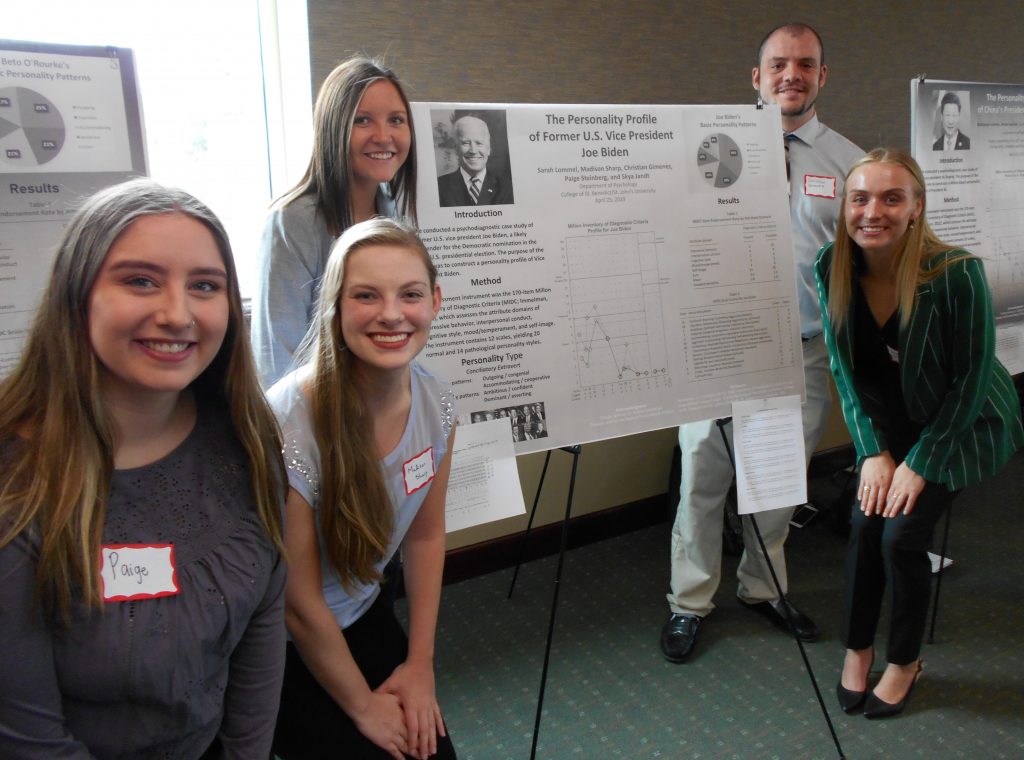
Paige Steinberg, Madison Sharp, Skya Jandt, Christian Giminez, and Sarah Lommel present their poster, “The Personality Profile of U.S. Vice President Joe Biden,” at Scholarship Day, College of St. Benedict, St. Joseph, MN, April 25, 2019.
Psychological profiles of world leaders presented at ISPP — July 5, 2018
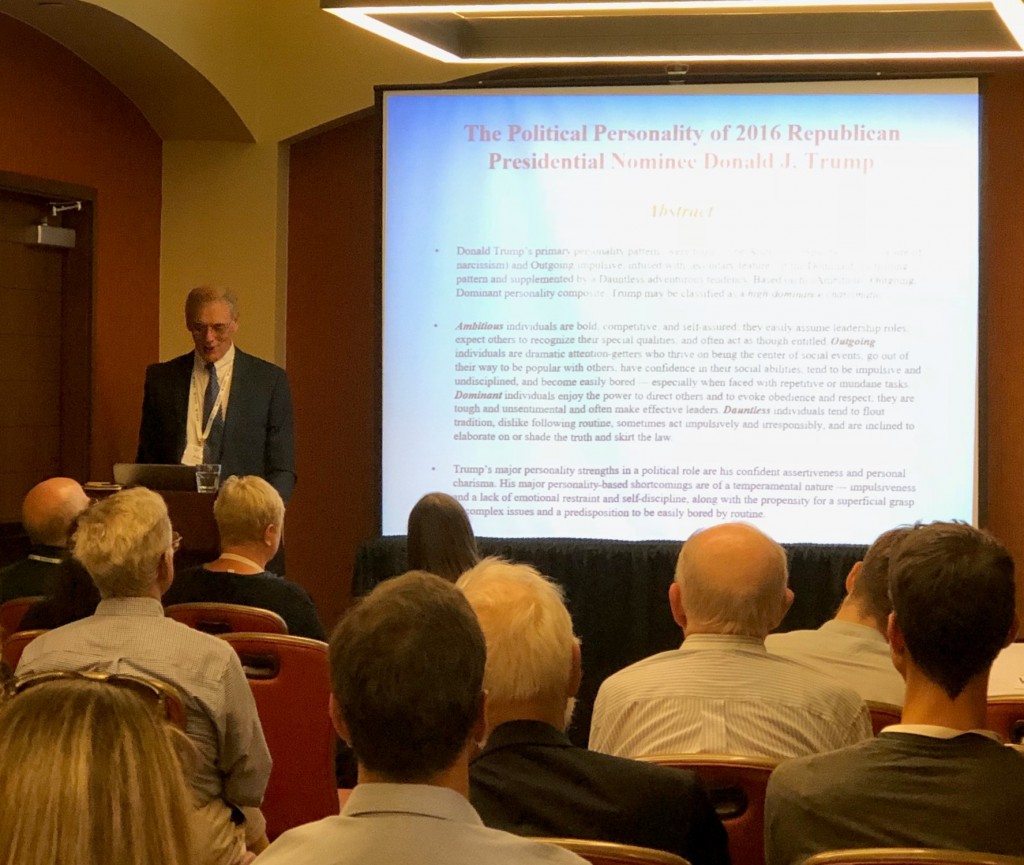
Aubrey Immelman presents his paper on “The Political Personality of 2016 Republican Presidential Nominee Donald J. Trump” at the 41st Annual Scientific Meeting of the International Society of Political Psychology, San Antonio, Texas, July 4-7, 2018.
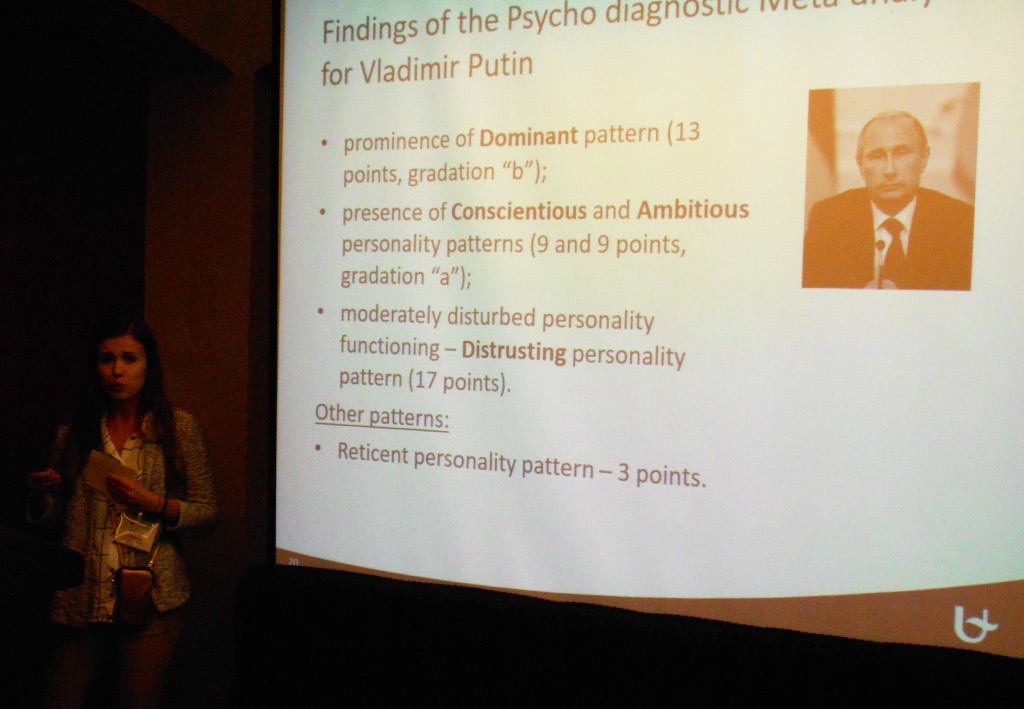
Ganna Diedkova presents the results of her research, with Christ’l De Landtsheer, on “The Value of Electability in a Hybrid Regime: Comparing Personality Profiles of Russian President Vladimir Putin and His Opponent Alexei Navalny” at the 41st Annual Scientific Meeting of the International Society of Political Psychology, San Antonio, Texas, July 4-7, 2018.
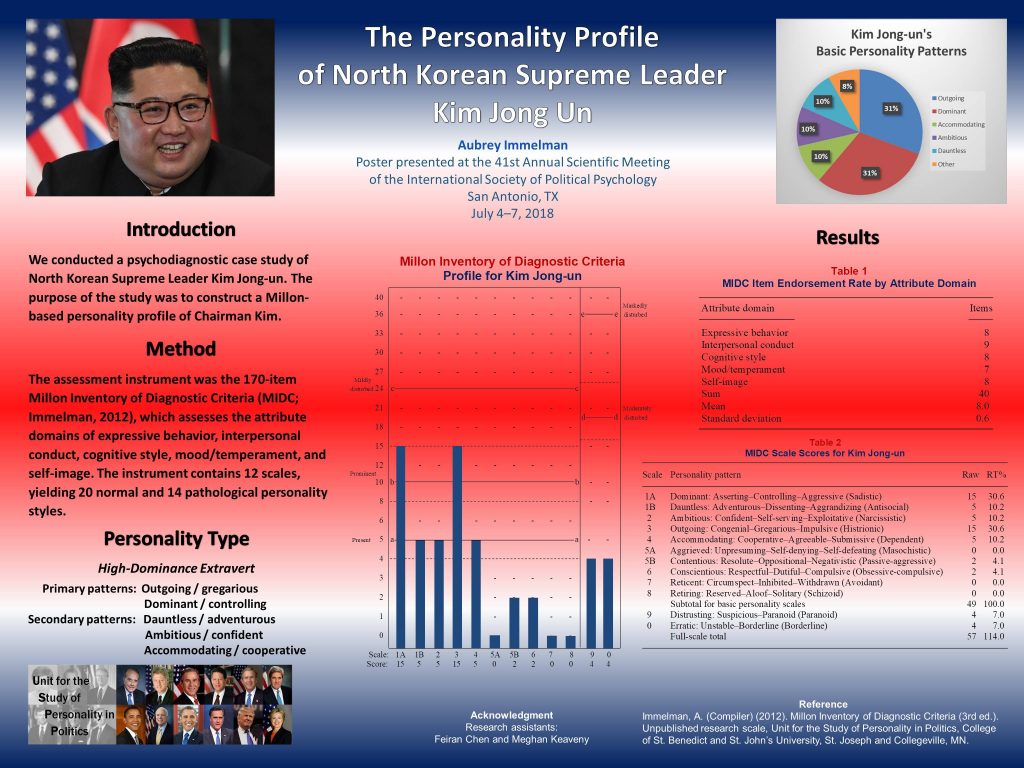
USPP releases new research report — June 11, 2018
The Leadership Style of North Korean Supreme Leader Kim Jong Un
Working paper by Aubrey Immelman, Unit for the Study of Personality in Politics, St. John’s University and the College of St. Benedict, Collegeville and St. Joseph, Minn., June 10, 2018. Abstract and full text available for download at Digital Commons: https://digitalcommons.csbsju.edu/psychology_pubs/120/
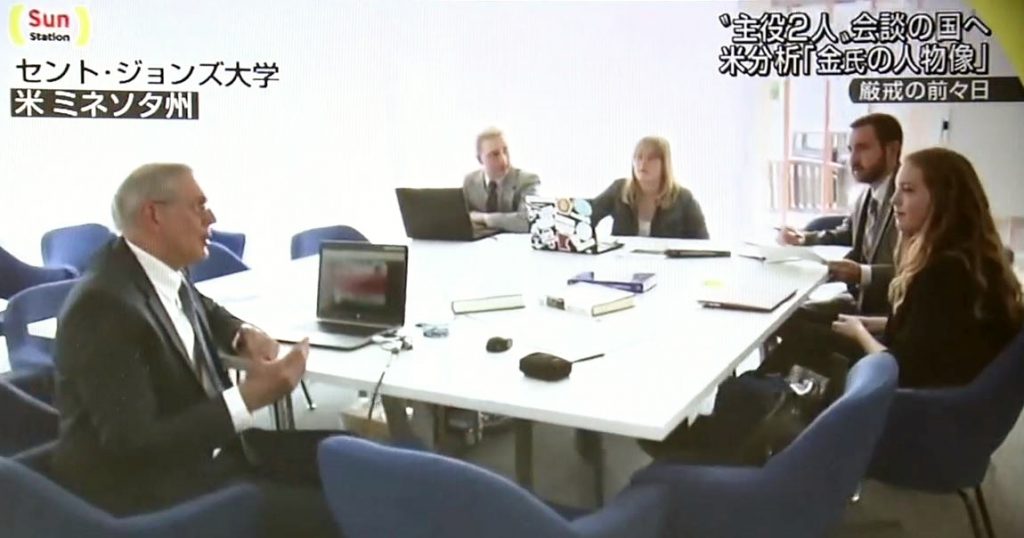
Members of the Unit for the Study of Personality in Politics research team on TV Asahi in Japan to provide analysis for the Singapore summit between U.S. President Donald Trump and North Korea’s Chairman Kim Jong-un on June 12, 2018. From left to right: Aubrey Immelman, Jim Hasselbrink, Anna Faerber, Joe Trenzeluk, Katelyn Hendrickson (screen shot courtesy TV Asahi).
Featured presentation

On February 27-28, 2019, U.S. president Donald Trump and North Korean leader Kim Jong-un will have a second summit meeting in Hanoi, Vietnam.
PowerPoint: Kim Jong Un Psychological Profile
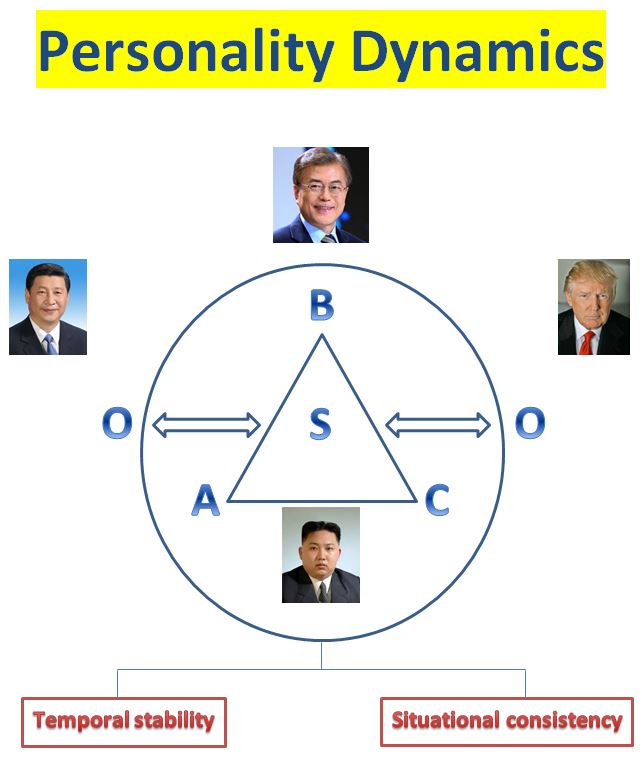
————————————————————————
Featured profiles
Compare the psychological profiles of Vladimir Putin and Donald Trump
The Political Personality of Russian Federation President Vladimir Putin. Working paper, Unit for the Study of Personality in Politics, January 2017. Abstract and link for full-text (38 pages; PDF) download at Digital Commons: http://digitalcommons.csbsju.edu/psychology_pubs/104/
The Political Personality of 2016 Republican Presidential Nominee Donald J. Trump. Working paper, Unit for the Study of Personality in Politics, St. John’s University/College of St. Benedict, October 2016. (Paper presented at the 41st Annual Scientific Meeting of the International Society of Political Psychology, San Antonio, TX, July 4-7, 2018.) Abstract and link for full-text (31 pages; PDF) download at Digital Commons: http://digitalcommons.csbsju.edu/psychology_pubs/103/
The Leadership Style of U.S. President Donald J. Trump. Working paper, Unit for the Study of Personality in Politics, St. John’s University/College of St. Benedict, January 2017. Abstract and link for full-text (14 pages; PDF) download at Digital Commons: http://digitalcommons.csbsju.edu/psychology_pubs/107/
The Personality Profile and Leadership Style of U.S. President Donald J. Trump in Office. Paper presented at the 43rd Annual Scientific Meeting of the International Society of Political Psychology, Berlin, Germany, July 14-16, 2020. Abstract and link for full-text (71 pages; PDF) download at Digital Commons: http://digitalcommons.csbsju.edu/psychology_pubs/129/
Work at the Unit for the Study of Personality in Politics is dedicated to the memory of Theodore Millon, Ph.D., D.Sc.
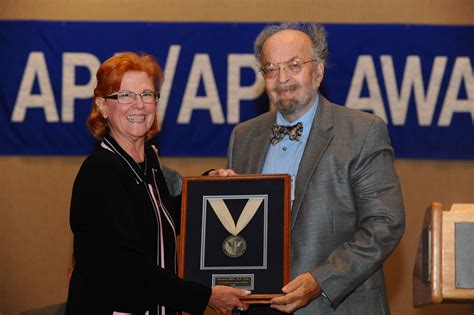
Dr. Theodore Millon receives the Gold Medal Award for Lifetime Achievement in the Application of Psychology at the 2008 annual meeting of the American Psychological Association in Boston, Mass.
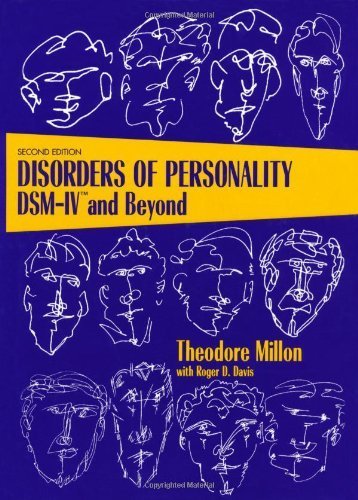
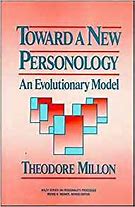

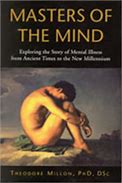

Immelman, A., & Millon, T. (2003, June). A research agenda for political personality and leadership studies: An evolutionary proposal. Unpublished manuscript, Unit for the Study of Personality in Politics, St. John’s University and the College of St. Benedict, Collegeville and St. Joseph, MN. Retrieved from Digital Commons website: http://digitalcommons.csbsju.edu/psychology_pubs/124/

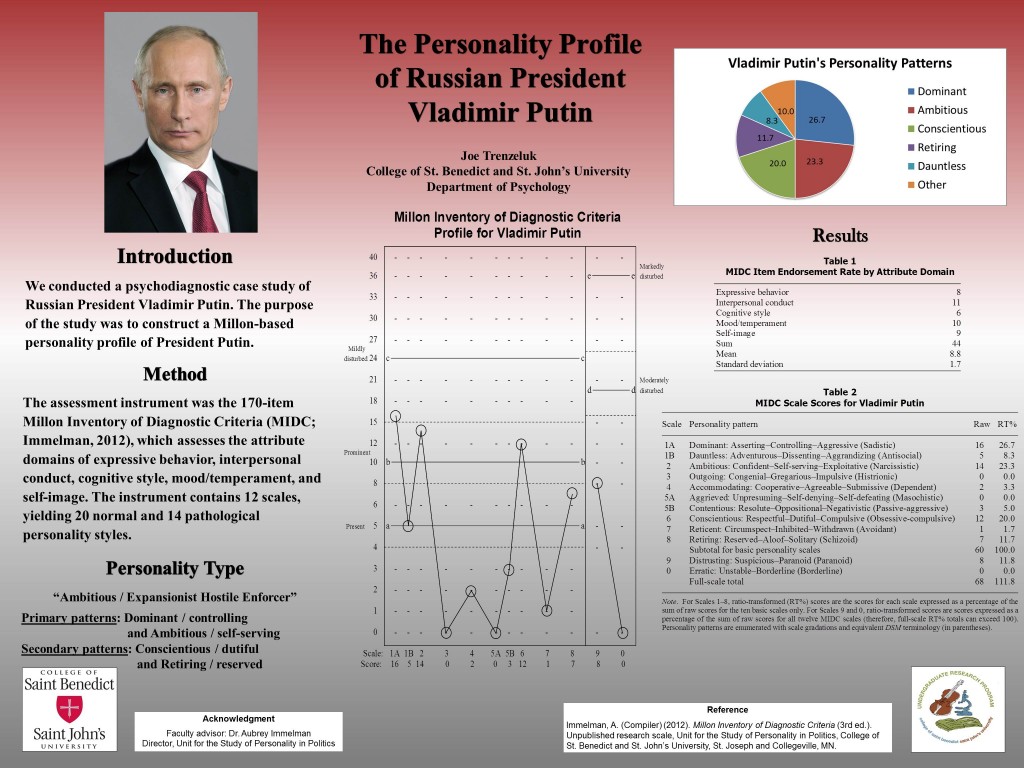
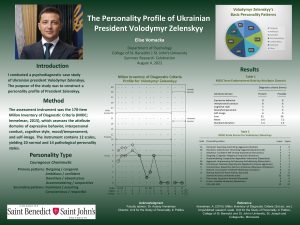
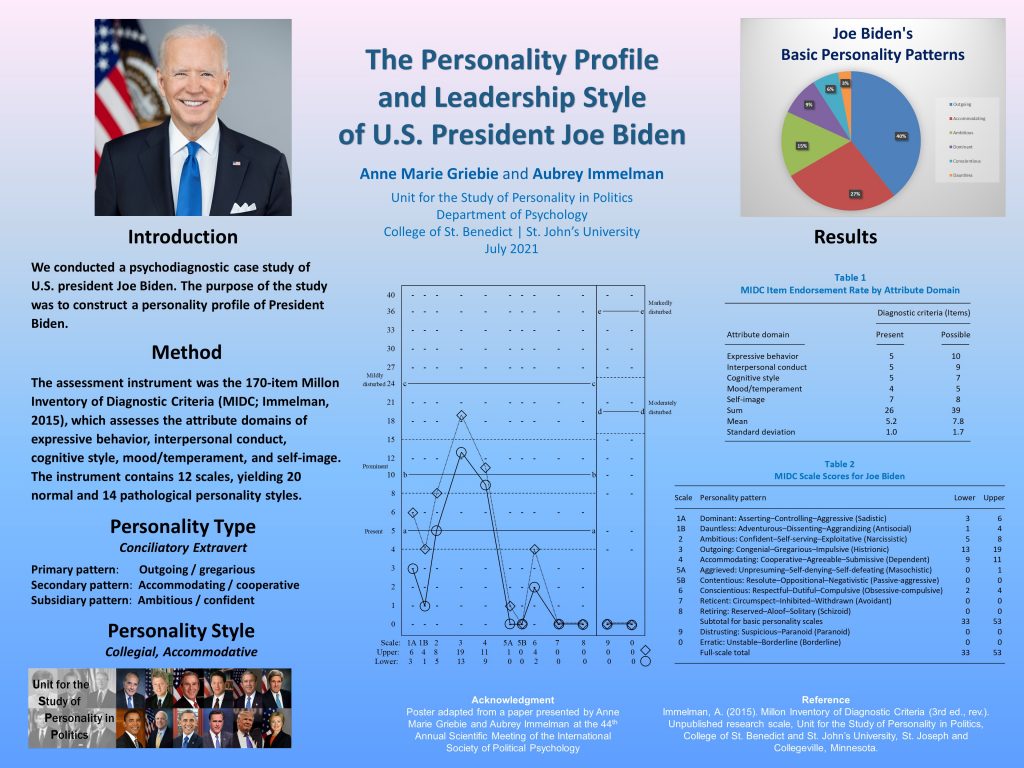


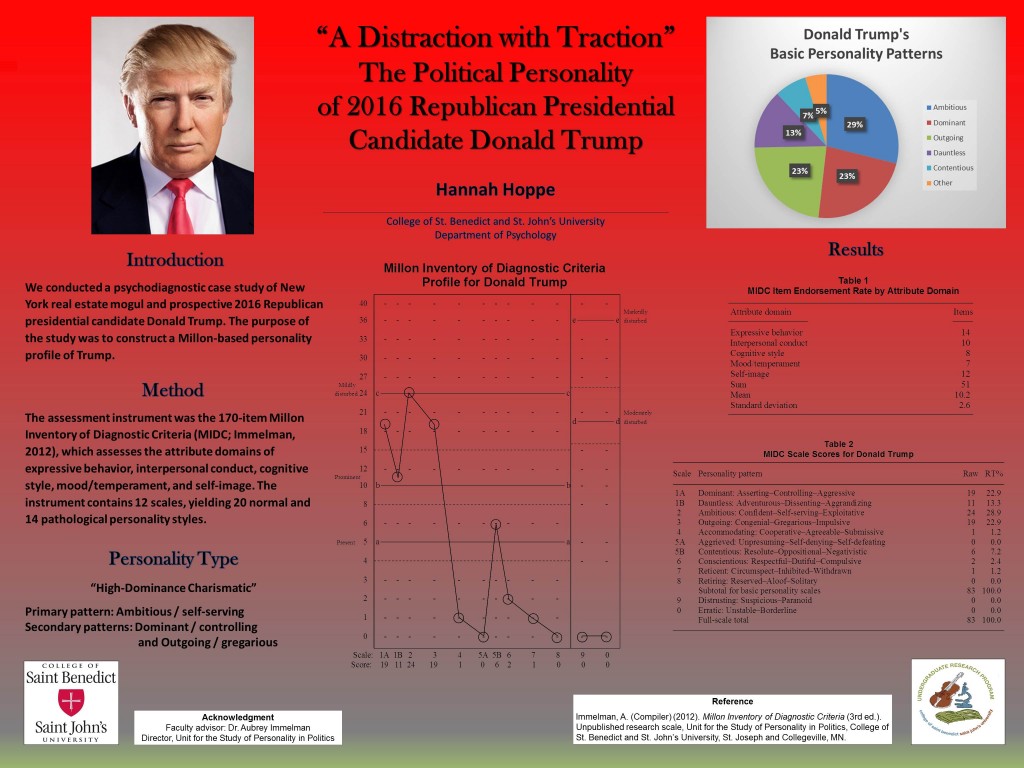










Follow Aubrey Immelman